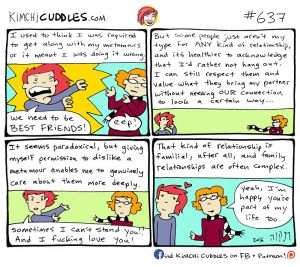Metamour
A metamour (from greek μετά meta, "beyond", and Latin amor, „love“) is the partner of the partner. Metamours are not directly connected through a romantic or sexual relationship with each other.[1]
A commonly used abbreviation is meta. For example: "Two people having a relationship with the same person are each other's metas." Partner's of metamours are referred to as meta-metamours or telemours to imply some degree of closeness.[2]

Generally, relationships between metamours can differ from each other. In kitchen table polyamory, metamours get along well and even form deep friendships. Others might not like their metamours or don't want to meet them for different reasons. In "don't ask, don't tell" (or DADT for short), people don't want to know about their metamours at all. This relationship dynamic needs to be consensual to be considered polyamory or ethical nonmonogamy in general.
While people often prefer when their metamours get along with each other for reasons of communication in the polycule[3], there's also criticism that relationships between metamours or kitchen table polyamory should not be forced.[4]
February 28th is Metamour Day. This date is chosen to be the "double value" of the 14th of the same month (Valentine's Day). This was introduced by the NCSF.[5]
Notes[edit]
- ↑ Elisabeth A. Sheff Ph.D., CSE, Delighting in Your Beloveds’ Other Lovers, (Psychology Today, February 26, 2019)
- ↑ Kinkly.com, Telemour, (Kinkly.com, December 2019)
- ↑ Laura Boyle, Kitchen Table to Parallel Polyamory, Part 8: Extreme Parallel and Don’t Ask, Don’t Tell, (READY FOR POLYAMORY, April 1, 2020)
- ↑ Evita Sawyers, When You Have Partners Who Don’t Get Along: A Few Tips, (Instagram, February 9, 2021)
- ↑ national coalition for sexual freedom, NCSF Proudly Launches Metamour Day!, (NCSF, February 23, 2019)